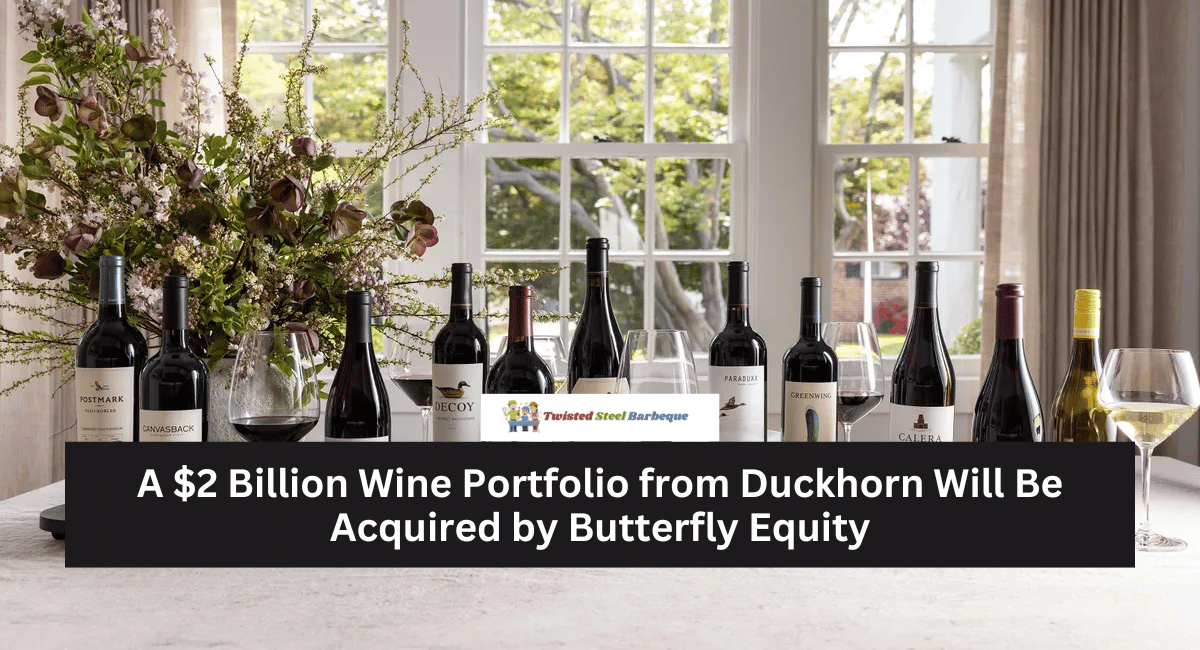In the world of luxury wine, private equity firm Butterfly Equity has made a significant announcement: it will buy the Duckhorn Portfolio for a whopping $1.95 billion in cash.
This deal highlights a broader trend of consolidation in the luxury wine market as businesses attempt to adjust to shifting consumer preferences and challenging economic conditions.
The Details of the Purchase
Based in Napa Valley, California, Duckhorn Portfolio manages 11 vineyards around the West Coast. After the acquisition, Duckhorn will continue operating under its present name and become a privately held company.
The Duckhorn Portfolio is currently traded on the New York Stock Exchange under the ticker NAPA. This acquisition is a significant milestone for the company, helping it prepare for future growth.
Since its founding in 2016, Butterfly Equity has become a well-known name in the food and beverage industry by acquiring many well-known companies, including Qdoba restaurants, Milk Specialties Global, Bolthouse Fresh Foods, and Orgain.
Duckhorn’s goals in the high-end wine market will be supported by the company’s experience managing and enhancing the operations of its portfolio companies.
Impact of the Present Market Circumstance
The premium wine industry is consolidating due to several factors, including changing drinking habits among younger customers. As consumer tastes shift, many well-known businesses defy their strategies to remain competitive.
This acquisition of Duckhorn is not merely a one-time event. It signifies a significant shift in the sector as companies adapt to declining sales and changing market conditions.
According to the International Organization of Vine and Wine (OIV), wine consumption fell 2.6% in 2023 the most since 1996. Many wineries have responded to this decline by reassessing their offerings and marketing strategies.
Deirdre Mahlan, Duckhorn’s president and CEO, acknowledged on a June results call how current market conditions impacted the company’s performance in the first half of the year. Despite the challenges, she emphasized that excellent wines particularly those priced between $15 and $25 remain highly sought-after and perform better than less costly alternatives under $15.
Duckhorn’s Outlook: Exciting Future
According to Deirdre Mahlan, who expressed hope for the acquisition, Butterfly’s investment will facilitate Duckhorn’s next phase of development. “Butterfly brings a proven track record of strengthening its portfolio companies while helping them advance their long-term strategic objectives,” Mahlon stated in a press release.
With better resources anticipated from this partnership, Duckhorn ought to be able to grow and develop its operations.
With this most recent acquisition, Duckhorn has strengthened its position in the premium wine market by adding Decoy and Kosta Browne to its roster of well-known brands. This roster includes Sonoma-Cutrer Vineyards, a California Chardonnay grower, which it purchased from spirits giant Brown-Forman last October for $400 million.
“We believe the Company’s curated suite of luxury wine brands, structurally advantaged business model, and the world-class team has laid the foundation for a powerful, scalable platform, which will continue to drive growth both organically and through strategic acquisitions,” Vishal Patel, a partner at Butterfly Equity, said.
Problems Associated with Member Interests
Despite Duckhorn’s numerous opportunities due to the acquisition, certain stakeholders are concerned. Wohl & Fruchter LLP, a firm that focuses on corporate fraud cases, announced that it is investigating whether Duckhorn’s board of directors prioritized the interests of the shareholders during the talks of a deal for more than $2 billion.
The law firm investigates whether the $11.10 per share agreed upon is acceptable and if all pertinent transaction information was adequately disclosed.
In high-stakes transactions like this one, critics emphasize the crucial role of transparency and caution since the board’s decisions may not align with shareholder interests. These inquiries are common in large transactions because shareholders occasionally want to ensure they are fairly compensated for their interests.
Conclusion
Butterfly Equity’s acquisition of Duckhorn Portfolio represents a significant shift in the premium wine industry. This acquisition emphasizes the ongoing trend of industry consolidation as companies adapt to shifting customer needs and market conditions.
For this storied winemaker, Duckhorn appears bright since Duckhorn is prepared to use Butterfly’s resources and expertise.
However, a thorough reading of the agreement reminds us of the importance of corporate governance and shareholder interests in such big changes.
As the industry navigates these challenges, the outcome of this deal may serve as a barometer for the broader luxury wine market, influencing the next mergers and acquisitions as companies navigate a constantly changing landscape.
READ MORE: The Most Recent Product Release at Costco Is Sure to Excite Harry Potter Fans

